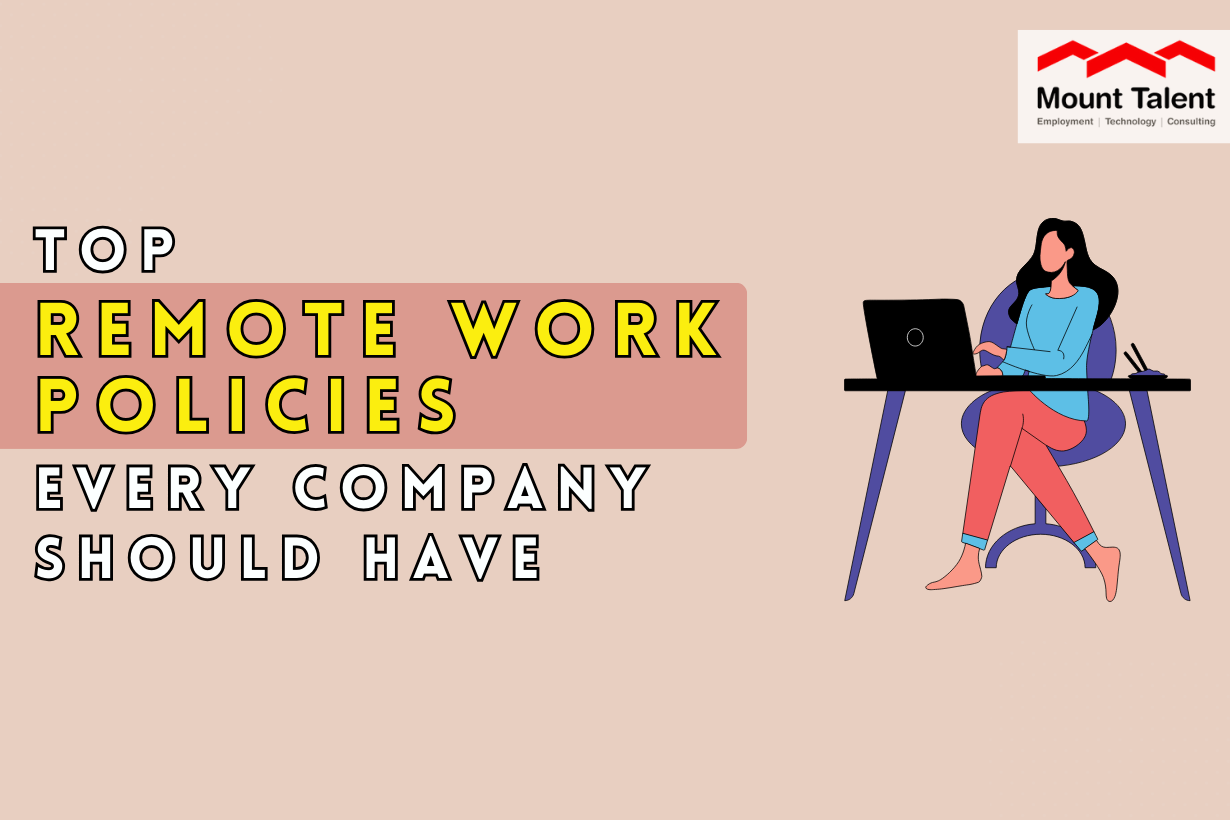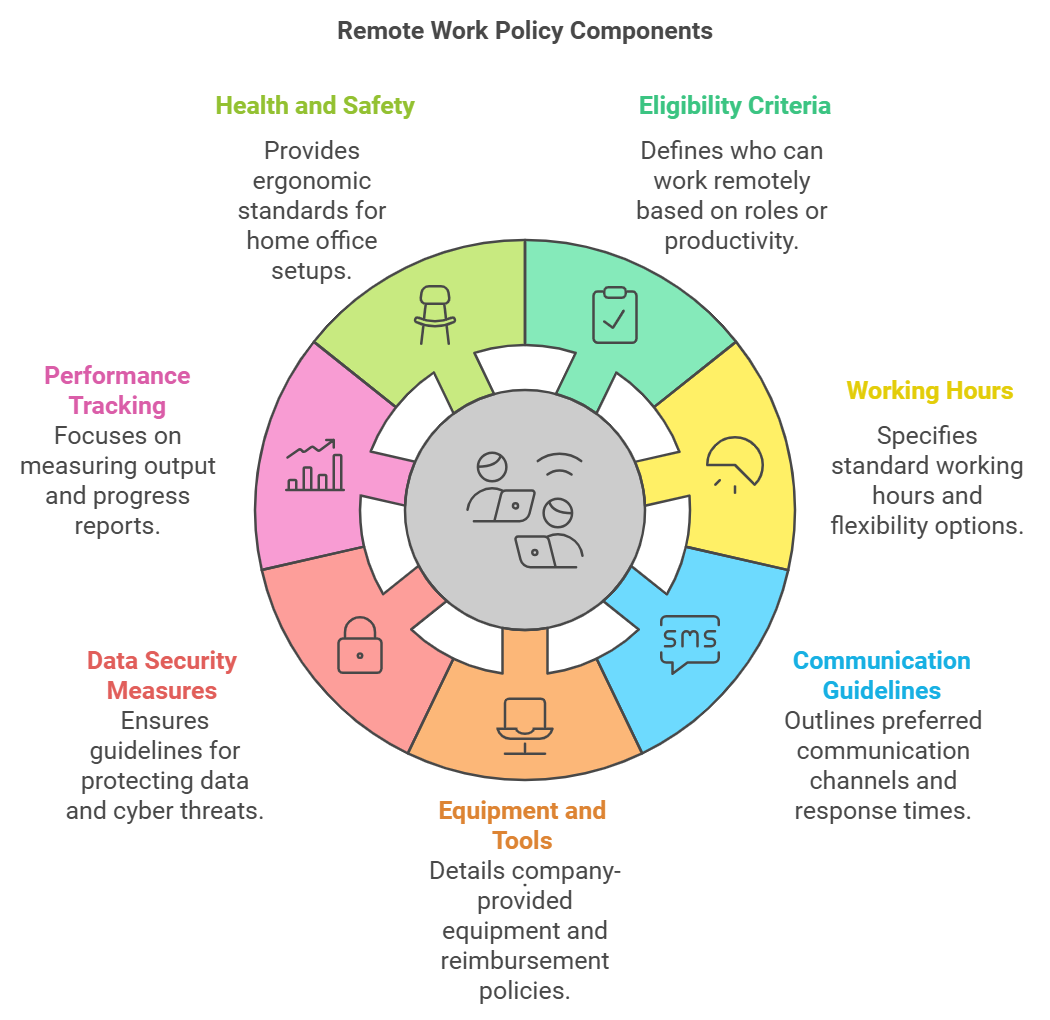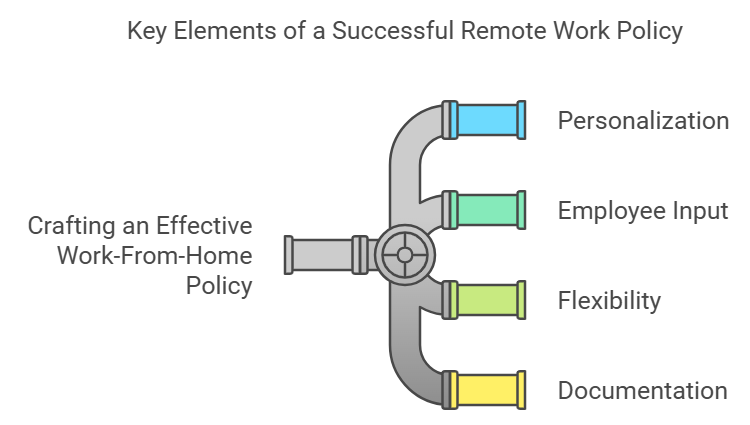
Top Remote Work Policies Every Company Should Have
- by Mayank Thapa
With work-from-home set to be the new business standard, organizations have to implement and effectively address the principles of managing teleworking employees. A well-developed remote work policy should demonstrate clarity on remote work, policy consistency, and increase productivity hence minimizing conflict of expectation between employees and employers. This article is a guide to valuable factors in the work-from-home policy and tips for best practices for companies.
Why is a Remote Work Policy Essential?
1. Sets Clear Expectations
Well-developed remote work policy Is highly specific in stating the roles and responsibilities as well as expectations so that remote employees do not get confused.
2. Ensures Productivity
Issuing clear work schedules, deadlines for delivering assignments, and the communication medium enables the employees to work effectively while working from home.
3. Promotes Work-Life Balance
This means that the remote work-from-home policy that is constructed should help in creating barriers for the employees so that they do not risk their Mental Health.
4. Ensures Legal Compliance
These types of policies are also useful enabling companies to respect labor laws, working hours, and the safety of remote employees.
Key Components of a Remote Work Policy

1. Eligibility Criteria
Define who can work remotely. It could be coupled with positions, rank, or productivity.
- Example: ”This remote work policy applies to employees with positions that they are not necessarily needed physically at the workplace.”
2. Working Hours
Designate standard working and possible flexibility options depending on the requirements of the company.
- Example: However, employees under this work from home policy are required to be physically available from 10 AM to 4 PM unless otherwise organized.
3. Communication Guidelines
Explain your top communication channels like Slack and Zoom and how quickly you will respond to queries.
- Example: “The remote work from home policy means that employees need to reply to emails within one day.”
4. Equipment and Tools
Specify if the company reimburses for hardware, software as well as for internet connection.
- Example: This spells out the remote work policy which specifically mentions that the company issues laptops and reimburses Internet expenses up to a certain amount per month.
5. Data Security Measures
Ensure guidelines on the use of information to control the risk of cyber threats are integrated.
- Example: “To meet the standard operating procedure adopted due to COVID-19 work-from-home directive, employees are required to use VPN to connect to servers”.
6. Performance Tracking
Explain what will be measured, which should be output and not hours.
- Example: “The company publishes goals and objectives that employees need to meet and is required to receive regular progress reports since the remote work policy deployment.”
7. Health and Safety
Should contain information about ergonomic standards and suggestions regarding proper home office design.
- Example: Employees are expected to stick to the ergonomic standards mentioned in the stay-at-home remote working policy.
Crafting an Effective Work-From-Home Policy

1. Personalization
It is recommended to adapt the remote work policy to your organization’s culture, the industry it is in or the needs of the employees.
2. Employee Input
Surveys can be executed in the organization to know the shortcomings in regard to work from home policy so as to modify it in the future.
3. Flexibility
It is necessary to be more flexible because it can be essential for employees to have time to care for their dependents.
4. Documentation
Ensure that remote work policy is written down, and is easily shared with workers through handbooks or even any online platform.
Benefits of Implementing a Remote Work Policy
1. Enhanced Productivity
By implementing the structure, employee concentration increases and work output improves as well.
2. Improved Employee Retention
The performance of workers with a professional remote work from home policy is more satisfying compared to a company that does not provide any such policies.
3. Cost Savings
Remote work eliminates expenses such as office rent, electricity bills, and transportation allowances.
4. Broader Talent Pool
The strong policy of working from home helps businesses acquire talents from other regions, which increases diversity and knowledge.
Challenges of Remote Work and Solutions
1. Communication Barriers
- Challenge: Disconnections owing to lack of human interface when directly interacting with the counterparts.
- Solution: Remind employees to check in often and to embrace video-based communication platforms.
2. Isolation
- Challenge: People might get out of touch with the other members of their groups.
- Solution: Incorporate team-building activities as an added working strategy that accompanies remote work policy.
3. Monitoring Performance
- Challenge: Measuring productivity without creating suspicion among the employees.
- Solution: Instead of concentrating on the number of hours you spend working or arguing with clients or colleagues online, remember that your primary goal is to achieve tangible products.
4. Data Security
- Challenge: The threat of cyber events which have always been part of the organizations’ risk environment tends to be considerably magnified.
- Solution: Ensure that working from home policy requires secure networks and a strong password for secure access.
Trends of the Future for Remote Work Policies
1. Hybrid Work Models
Solutions for achieving the best of both worlds efficiency of most work arrangements and face-to-face teamwork.
2. AI Integration
Applying AI in the organization and control of work and completing more personal tasks.
3. Wellness Programs
Integrating counseling services into the work from home model due to the abrupt change of this practice.
4. Global Compliance
Flexibility of policies to provide compliance with international labor laws in regard to the distributed workforce.
Conclusion
Flexible work arrangements are inevitable, and, therefore, a good remote work policy is crucial for success in the modern workplace. It enhances efficiency, possible time management, employee relations, and an overall strong organizational culture. Management should update work-from-home policies from time to time due to changing workforce aspects. Our firm, Mount Talent Consulting, assists organizations in developing the best policies to secure organizational success and employee satisfaction. Login to mounttalnet.com for more details.
Frequently Asked Questions
- What is a remote work policy?
A remote work policy is a framework of working rules based on the expectations, roles, and processes of employees who are to work remotely or outside the office.
- What are some reasons to have a work from home policy?
The work-from-home policy provides order, increases efficiency, and clears up expectations from people who telecommute.
- What should be included in a remote work from home policy?
They should state the requirements for being considered for work, expected working hours, rules governing communication, availability of equipment, and methods of data protection.
- How do remote work policies improve productivity?
Most of the time, it eliminates confusion and contributes to appropriate and optimum performance since everything is well outlined.
- How can companies enforce remote work policies?
It can be in the form of a standard checklist, appraisal schedule, and compliance with documented practice in the policy on remote work.
With work-from-home set to be the new business standard, organizations have to implement and effectively address the principles of managing…
